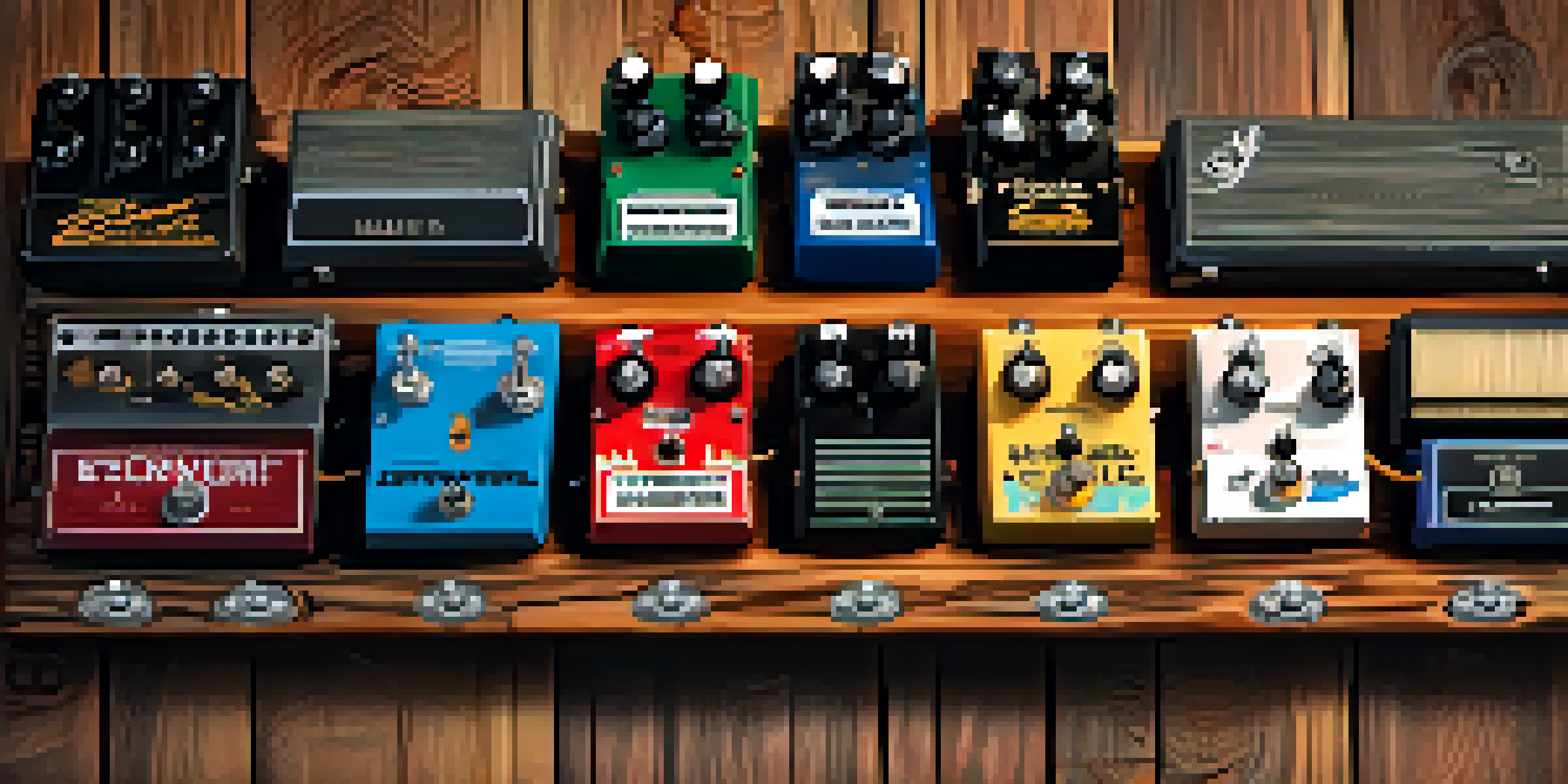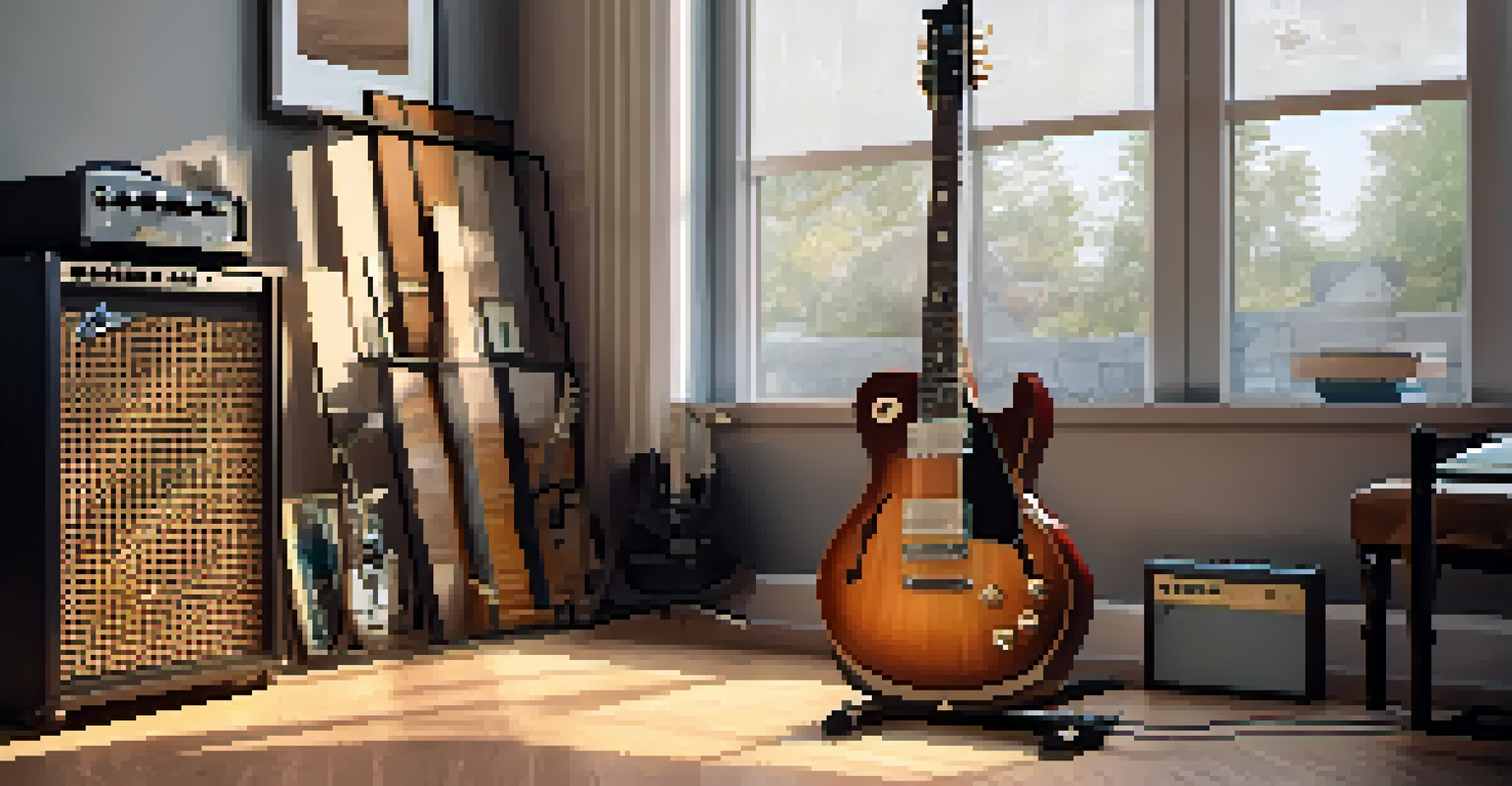The Best Reverb Pedals: Top Picks for Every Guitarist

Understanding Reverb: What It Brings to Your Sound
Reverb is one of the most crucial effects in a guitarist's toolkit. It adds depth and ambiance, transforming a dry sound into something lush and expansive. Think of it as the echo of your music bouncing off the walls of a grand hall, creating a sense of space that makes every note resonate.
Reverb is the heart of the sound, providing depth and atmosphere that can transform any performance.
By simulating this natural phenomenon, reverb pedals allow you to evoke different environments, from a small room to an expansive cathedral. This versatility is what makes reverb an essential effect for both live performances and studio recordings. The right reverb can elevate your playing, making even simple riffs sound more sophisticated.
As you explore the world of reverb pedals, you'll discover a variety of types and settings that can cater to your unique style. Whether you're a blues player looking for subtle warmth or a shoegaze enthusiast craving vast soundscapes, the right pedal can help you achieve your desired sonic landscape.
Top Picks: Best Reverb Pedals for Beginners
For beginners, choosing a reverb pedal can feel overwhelming given the plethora of options available. However, some models stand out for their ease of use and excellent sound quality. One highly recommended option is the TC Electronic Hall of Fame, known for its user-friendly interface and a selection of reverb types that can suit any genre.

Another great choice for newcomers is the Boss RV-6, which combines simplicity with versatility. Its built-in modes allow you to explore everything from classic spring reverb to more modern ambient sounds, making it an ideal starting point for any guitarist. Plus, its durable design ensures it can withstand the rigors of gigging.
Reverb Enhances Musical Depth
Reverb adds depth and ambiance to your sound, transforming simple notes into lush, expansive tones.
Investing in a solid beginner-friendly reverb pedal sets the stage for your musical journey. As you grow in skill and style, these pedals will not only enhance your sound but also inspire creativity in your playing.
Versatile Options: Best Reverb Pedals for Intermediate Players
Intermediate players often seek pedals that offer a blend of quality and versatility. The Strymon BlueSky is a standout option, providing an array of reverb types, from lush plates to shimmering modulated sounds. Its intuitive controls allow players to craft their perfect sound with ease, making it a favorite among those looking to refine their tone.
The right effects can elevate your music from ordinary to extraordinary, and reverb is a powerful tool in that transformation.
Another excellent choice is the Electro-Harmonix Holy Grail. This pedal is celebrated for its rich, expansive reverb effects that can transform your guitar into an atmospheric soundscape. With its simple design and reliable performance, it’s a perfect fit for those ready to dive deeper into the world of reverb.
As you transition to intermediate playing, the right reverb pedal can open new creative avenues. These versatile options help to enhance your musical expression and push the boundaries of your sound.
Pro-Level Pedals: Best Reverb Options for Advanced Guitarists
Advanced guitarists often look for reverb pedals that provide comprehensive control and high-quality sound. The Eventide Space is a top-tier choice, offering a plethora of reverb algorithms and customization options. This pedal is perfect for those who want to dive deep into sound design and create unique atmospheric textures.
Another exceptional option is the Neunaber Immerse Reverberator, which is renowned for its lush reverbs and modulation capabilities. With its intuitive controls and ability to store presets, it allows advanced players to craft complex soundscapes that can be easily recalled during performances.
Choosing the Right Pedal Matters
Selecting the appropriate reverb pedal based on your skill level can significantly impact your playing experience and creativity.
For seasoned musicians, investing in a professional-grade reverb pedal is essential to achieving that signature sound. These options not only elevate your playing but also provide the flexibility to explore a wide range of auditory experiences.
Digital vs. Analog Reverb Pedals: Which is Right for You?
When choosing a reverb pedal, one key consideration is whether to go for a digital or analog model. Digital reverb pedals often offer a wider range of sounds and settings, making them versatile and adaptable for various styles. They can emulate a variety of environments, from small rooms to vast halls, with impressive accuracy.
On the other hand, analog reverb pedals provide a warmth and character that many musicians find appealing. They often produce a more organic sound, particularly in genres like blues and rock, where a vintage feel is desired. The choice between digital and analog ultimately boils down to personal preference and the specific sound you want to achieve.
By understanding the differences between these types of reverb pedals, you can make a more informed decision that aligns with your musical style. Whether you prefer the precision of digital or the warmth of analog, both can enhance your sound in unique ways.
Unique Features to Look for in Reverb Pedals
When shopping for a reverb pedal, it's crucial to consider the unique features that can enhance your playing experience. Look for pedals with multiple reverb types, such as plate, spring, and hall, to give you a broad palette of sounds to choose from. Additionally, features like modulation can add depth and richness to your reverb, elevating your tone even further.
Another important aspect is the ability to save presets. This feature allows you to quickly switch between different settings during a performance, making it easier to adapt to various musical moments. If you play in different styles or with multiple bands, this can be a game-changer.
Maintenance Ensures Longevity
Proper maintenance and care of your reverb pedal can extend its lifespan and maintain optimal performance.
Lastly, consider the pedal's size and footprint on your pedalboard. A compact design can save space, but make sure it doesn't compromise the features and sound quality you need. By keeping these factors in mind, you can find a reverb pedal that fits your style and enhances your musical journey.
Maintaining Your Reverb Pedal: Tips for Longevity
To ensure your reverb pedal lasts for years, proper maintenance is key. Start by regularly inspecting the pedal for any loose connections or damage, especially if you transport it frequently. Keeping your gear in a protective case can prevent unnecessary wear and tear, extending its lifespan.
Additionally, be mindful of the settings you use. Some reverb pedals can be sensitive to extreme settings, leading to potential damage over time. Experiment with different tones carefully, and always start with lower levels before gradually increasing them to avoid pushing the pedal beyond its limits.

Lastly, don’t forget to clean your pedalboard and connections. Dust and debris can accumulate, affecting the performance of your reverb pedal. A little care can go a long way in maintaining your equipment and ensuring you always sound your best.
Conclusion: Finding Your Perfect Reverb Pedal
Choosing the right reverb pedal can significantly impact your sound and playing experience. From beginner-friendly options to professional-grade models, there's something for every guitarist's needs and preferences. Remember to consider factors such as sound quality, versatility, and features that suit your style.
As you explore different pedals, don't hesitate to try them out in a store or at home to see which one resonates with you. The right reverb pedal will not only enhance your tone but also inspire creativity and elevate your playing to new heights.
Ultimately, finding your perfect reverb pedal is about personal preference and how it fits into your musical journey. Embrace the process of discovery, and enjoy the rich soundscapes that reverb can create in your music.